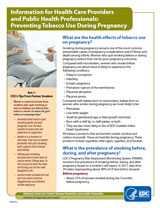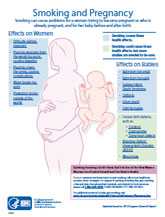Tobacco Use and Pregnancy
On This Page
- How Does Smoking During Pregnancy Harm My Health and My Baby?
- What are e-cigarettes? Are they safer than regular cigarettes in pregnancy?
- How Many Women Smoke During Pregnancy?
- What Are the Benefits of Quitting?
- Quitting Smoking Can Be Hard, But It Is One of the Best Ways a Woman Can Protect Herself and Her Baby's Health
- How Does Other People’s Smoke (Secondhand Smoke) Harm My Health and My Child’s Health?
- What Can You Do to Avoid Other People’s Smoke?
- Resources
How Does Smoking During Pregnancy Harm My Health and My Baby?
Most people know that smoking causes cancer, heart disease, and other major health problems. Smoking during pregnancy causes additional health problems, including premature birth (being born too early), certain birth defects, and infant death.
-
- Smoking makes it harder for a woman to get pregnant.
- Women who smoke during pregnancy are more likely than other women to have a miscarriage.
- Smoking can cause problems with the placenta—the source of the baby’s food and oxygen during pregnancy. For example, the placenta can separate from the womb too early, causing bleeding, which is dangerous to the mother and baby.
- Smoking during pregnancy can cause a baby to be born too early or to have low birth weight—making it more likely the baby will be sick and have to stay in the hospital longer. A few babies may even die.
- Smoking during and after pregnancy is a risk factor of Sudden Infant Death Syndrome (SIDS). SIDS is an infant death for which a cause of the death cannot be found.
- Babies born to women who smoke are more likely to have certain birth defects, like a cleft lip or cleft palate.
What are e-cigarettes? Are they safer than regular cigarettes in pregnancy?
Electronic cigarettes (also called electronic nicotine delivery systems or e-cigarettes) come in different sizes and shapes, including “pens,” “mods,” (i.e., these types are modified by the user) and “tanks.” Most e-cigarettes contain a battery, a heating device, and a cartridge to hold liquid. The liquid typically contains nicotine, flavorings, and other chemicals. The battery-powered device heats the liquid in the cartridge into an aerosol that the user inhales.
Although the aerosol of e-cigarettes generally has fewer harmful substances than cigarette smoke, e-cigarettes and other products containing nicotine are not safe to use during pregnancy. Nicotine is a health danger for pregnant women and developing babies and can damage a developing baby’s brain and lungs. Also, some of the flavorings used in e-cigarettes may be harmful to a developing baby. Learn more about e-cigarettes and pregnancy.
How Many Women Smoke During Pregnancy?
According to the 2011 Pregnancy Risk Assessment and Monitoring System (PRAMS) data from 24 states
-
- Approximately 10% of women reported smoking during the last 3 months of pregnancy.
- Of women who smoked 3 months before pregnancy, 55% quit during pregnancy. Among women who quit smoking during pregnancy, 40% started smoking again within 6 months after delivery.
For more statistics on smoking during pregnancy see: PRAMStat, an online data platform developed to provide public access to over 250 maternal and child health indicators (including tobacco use) from the Pregnancy Risk Assessment Monitoring System (PRAMS).
What Are the Benefits of Quitting?
Quitting smoking will help you feel better and provide a healthier environment for your baby.

When you stop smoking
-
- Your baby will get more oxygen, even after just one day of not smoking.
- There is less risk that your baby will be born too early.
- There is a better chance that your baby will come home from the hospital with you.
- You will be less likely to develop heart disease, stroke, lung cancer, chronic lung disease, and other smoke-related diseases.
- You will be more likely to live to know your grandchildren.
- You will have more energy and breathe more easily.
- Your clothes, hair, and home will smell better.
- Your food will taste better.
- You will have more money that you can spend on other things.
- You will feel good about what you have done for yourself and your baby.
Quitting Smoking Can Be Hard, But It Is One of the Best Ways a Woman Can Protect Herself and Her Baby’s Health

If you or someone you know wants to quit smoking, talk to your doctor, nurse, or health care provider about strategies. For support in quitting, including free quit coaching, a free quit plan, free educational materials, and referrals to local resources, please call 1-800-QUIT-NOW (1-800-784-8669)More free help and support resources are available for pregnant women and others who want to quit for good.
Tips From Former Smokers
Watch and listen to real people living with the real and painful consequences of smoking.
How Does Other People’s Smoke (Secondhand Smoke) Harm My Health and My Child’s Health?
Breathing other people’s smoke make children and adults who do not smoke sick. There is no safe level of breathing others people’s smoke.
-
- Pregnant women who breathe other people’s cigarette smoke are more likely to have a baby who weighs less.
- Babies who breathe in other people’s cigarette smoke are more likely to have ear infections and more frequent asthma attacks.
- Babies who breathe in other people’s cigarette smoke are more likely to die from Sudden Infant Death Syndrome (SIDS). SIDS is an infant death for which a cause of the death cannot be found.
In the United States, 58 million children and adults who do not smoke are exposed to other people’s smoke. Almost 25 million children and adolescents aged 3–19 years, or about 4 out of 10 children in this age group, are exposed to other people’s cigarette smoke. Home and vehicles are the places where children are most exposed to cigarette smoke, and a major location of smoke exposure for adults too. Also, people can be exposed to cigarette smoke in public places, restaurants, and at work.
What Can You Do to Avoid Other People’s Smoke?
There is no safe level of exposure to cigarette smoke. Breathing even a little smoke can be harmful. The only way to fully protect yourself and your loved ones from the dangers of other people’s smoke is through 100% smoke-free environments.
You can protect yourself and your family by
-
- Making your home and car smoke-free.
- Asking people not to smoke around you and your children.
- Making sure that your children’s day care center or school is smoke-free.
- Choosing restaurants and other businesses that are smoke-free. Thanking businesses for being smoke-free.
- Teaching children to stay away from other people’s smoke.
- Avoiding all smoke. If you or your children have respiratory conditions, if you have heart disease, or if you are pregnant, the dangers are greater for you.
- Learn as much as you can by talking to your doctor, nurse, or health care provider about the dangers of other people’s smoke.
Resources
- Smokefree Women This page provides information and resources on quitting smoking targeted at women.
- Smokefree.gov A Web site dedicated to helping smokers quit.
- Treating Tobacco Use and Dependence: 2008 Update This update includes new, effective clinical treatments for tobacco dependence and the latest information to help people quit smoking.
- The Guide to Community Preventive Services This guide provides systematic reviews of the effectiveness of interventions to reduce tobacco use and secondhand smoke exposure.
- Tobacco Cessation Learn about investing in tobacco cessation to reduce smoking rates and health care costs and improve health outcomes from the Centers for Medicare & Medicaid Services.
- Page last reviewed: September 29, 2017
- Page last updated: September 29, 2017
- Content source:





 ShareCompartir
ShareCompartir